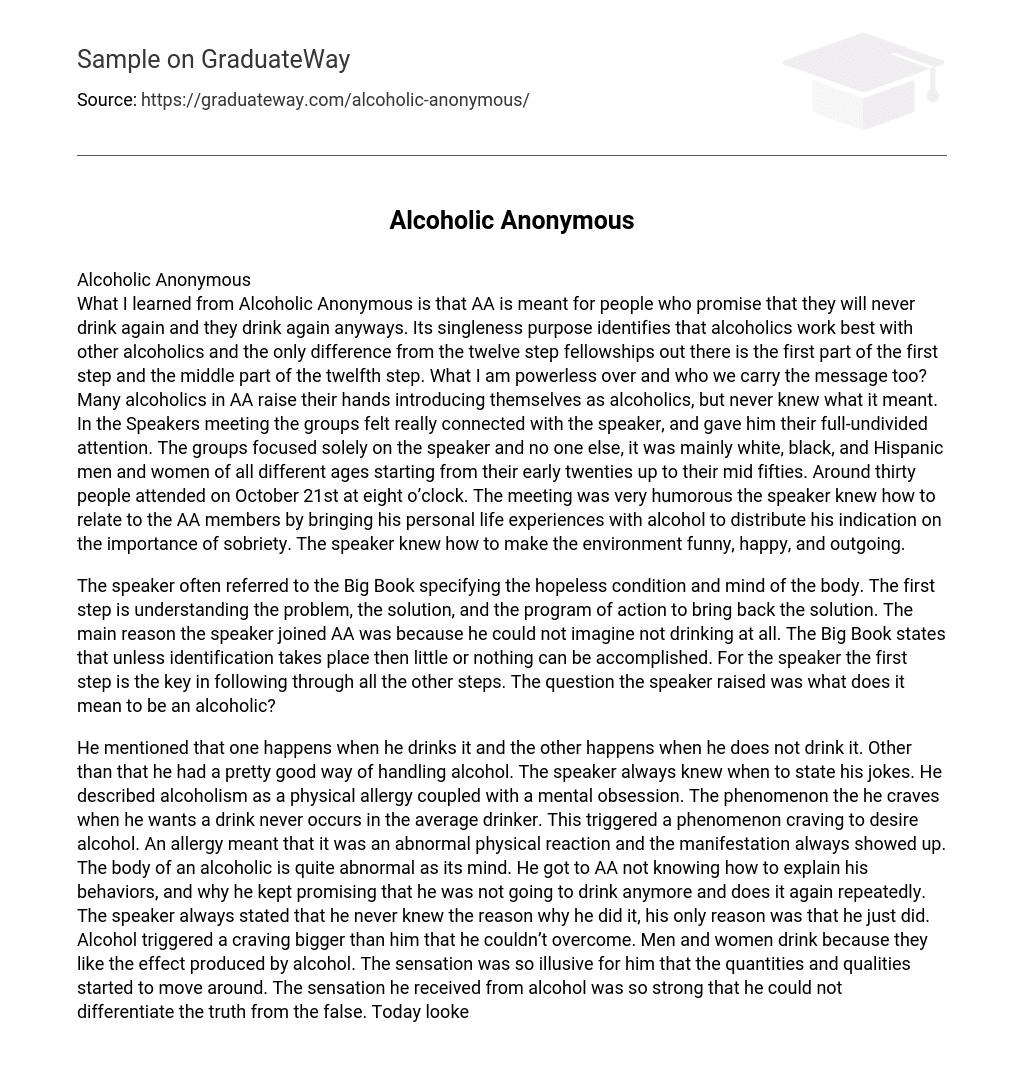According to what I learned in Alcoholic Anonymous (AA), AA is designed for individuals who pledge to never drink again but end up breaking their promise and drinking once more. AA emphasizes the importance of alcoholics working together, distinguishing itself from other twelve-step fellowships only in the initial part of the first step and the middle part of the twelfth step. It raises questions about things that are beyond my control and to whom we should deliver our message. Many alcoholics in AA identify themselves as such without truly comprehending its significance. During Speaker meetings, the groups establish a strong connection with the speaker and give their complete attention. These groups are primarily comprised of white, black, and Hispanic men and women across various age groups ranging from their early twenties to mid-fifties.
On October 21st at 8 o’clock, approximately thirty individuals gathered for a meeting. The speaker effectively highlighted the importance of sobriety to AA members by sharing personal alcohol-related experiences. Furthermore, the speaker skillfully fostered a pleasant and sociable environment, creating a lighthearted atmosphere.
The speaker frequently mentioned the Big Book, which focuses on the hopeless state of mind and body. The initial step involves comprehending the problem, the solution, and the necessary course of action to achieve the solution. The speaker’s primary motivation for joining AA was their inability to envision a life without drinking. According to the Big Book, without identification, minimal to no progress can be made. For the speaker, the first step acts as a crucial foundation for successfully completing all subsequent steps. The speaker posed the question: What does it truly mean to be an alcoholic?
He discussed experiencing different effects when he drinks alcohol compared to when he abstains. Despite this, he had good control over his consumption. The speaker had a knack for timing his jokes. He defined alcoholism as a combination of a physical allergy and a mental obsession. The intense craving for alcohol that he experienced was absent in average drinkers. This strong desire for alcohol was abnormal and always manifested itself physically. The body and mind of an alcoholic are both affected by this abnormality. Upon joining Alcoholics Anonymous, he struggled to comprehend his own actions and why he repeatedly broke promises to quit drinking. The speaker acknowledged that he never understood the root cause behind his behavior; he simply did it without reason. The powerful craving caused by alcohol was too overwhelming for him to overcome.
Both genders are attracted to the deceptive effects of alcohol. The speaker’s encounter with alcohol was so powerful that it distorted his perception of reality. Time appeared to merge, and he struggled to survive. This alcoholic lifestyle became his only normality. Nevertheless, the speaker acknowledges that without consuming that initial drink, his observations on how alcohol affects him would lack significance. According to the speaker, the desire for alcohol resides in his mind rather than his body. Although he recognizes a physical allergy to alcohol, his main problem is feeling restless, irritable, and discontented when sober. All of his issues seem to arise when he is not under the influence because quitting drinking does not resolve them.
He was unsure about whether or not to drink and shared with the audience his fondness for pawn shops, as they provided a straightforward solution. He could bring in a deer rifle and leave with money, without any pawnbroker questioning his intentions. However, his lack of personal belongings meant he had to pawn items that belonged to others, causing tension within his family. His difficult upbringing led him to run away at 47 and never return. I discovered that alcoholics are skilled at devising plans that ultimately fail in the end.
The speaker attempted to deceive the pawnshop in order to retrieve all of their belongings. They executed an insurance scheme and obtained enough money to reclaim everything. However, they were momentarily derailed when they stopped for a single drink, resulting in a five-day blackout where only 30 seconds of memories remain. This incident caused them to lose control and the ability to make decisions. Consequently, their life became unruly, leading them to acknowledge their inability to control their drinking as the first step towards reclaiming manageability.





